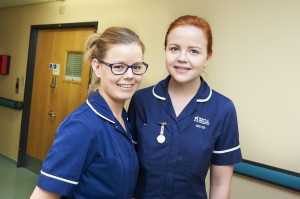It’s nearly the end of 2016 and we thought we’d spend the the twelve days of Christmas sharing some stories and successes from the last year from across the Trust, as well as some useful tips to stay healthy in 2017.
We’d like to wish you all a very Merry Christmas and a Happy New Year.
On the ninth day…
 A chemotherapy at home service run from a lifesaving cancer unit is celebrating its first birthday as it continues to develop and maintain quality of life for its patients.
A chemotherapy at home service run from a lifesaving cancer unit is celebrating its first birthday as it continues to develop and maintain quality of life for its patients.
The service has been boosted in recent months with the introduction of a second nurse, Lydia James, thanks in no small part to the fundraising exploits of Rob Eley, the former captain of the Solihull Barons Ice Hockey Team. Rob raised £40,000 through his year-long 19for19 campaign sparked after his wife was treated for cancer on the ward.
The service provides patients with the option to receive their chemotherapy treatment in the comfort of their own home. Receiving chemotherapy treatment at home has been shown to help to reduce disruption and stress from constant hospital visits and can be particularly beneficial to patients who are elderly or suffer with mobility problems.
The service, which has cared for 35 patients and made 584 community visits since its launch in November 2015, was originally set up with the support of donations from the Kay Kendall Leukaemia Fund with just one community chemotherapy nurse, Jackie Wilson.
Jackie said: “The money raised by Rob Eley through his campaign is a massive boost for the service as it helps us to carry on and further develop. That is the plan now to keep building and try and treat as many patients as we physically can. We are also looking at linking in with other community projects and have now started a weekly clinic at a local GP in Solihull – although still in its early stages we are hoping it will further prevent some patients from having to travel to Heartlands for treatment and clinic appointments.
“The reception to the service has been really positive. It has helped the patients maintain their quality of life. They don’t have the whole stress and anxiety of coming to hospital to have their treatment and arranging to get there and back whilst coping with fatigue and side effects.”
Another beneficial aspect to at-home treatment is that it provides patients with the opportunity to form relationships with their nurses, enabling them to feel more comfortable and able to ask questions.
Howard Sweetman, a patient receiving at-home treatment from Chelmsley Wood, said: “When you are on the unit there are a lot of people there receiving treatment but when the nurse comes to the house it is one-to-one – for 15 minutes it’s all about you.
“I think it has been really beneficial for me. I have a good rapport with the nurses; we have a laugh and a joke. They are absolutely lovely and really put you at ease. I definitely think the service is a wonderful idea and great for the patients and for the unit.”






